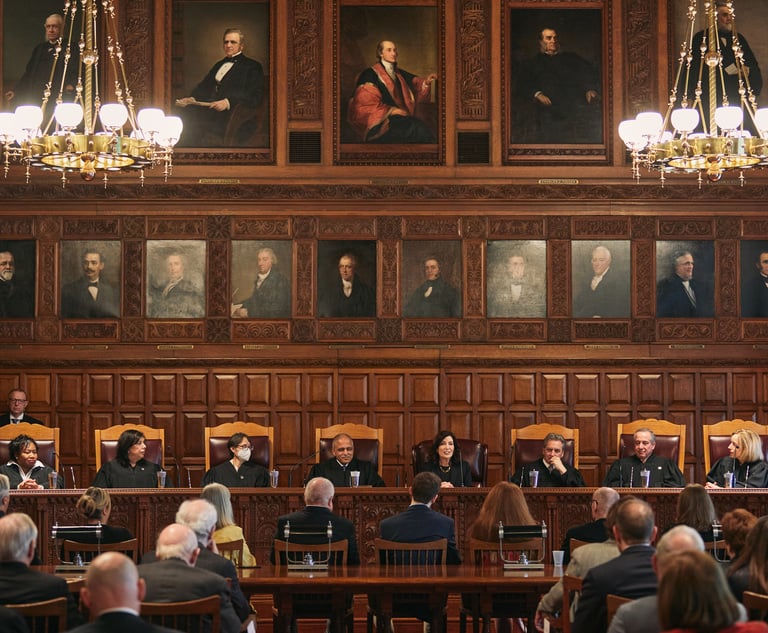Town and Village Courts Do Not Generate the Majority of Complaints
Our Town and Village justices, both attorney and non-attorney, represent the “courts closest to the people,” the courts in which the majority of the public may encounter their first interactions with our judicial system.
May 29, 2018 at 03:50 PM
4 minute read
 Tom Liotti's recent letter to the editor concerning our judiciary in the Town and Village Courts statewide, in my opinion, is just another example of counsel “shooting from the hip.” Rather than citing actual statistical facts, Mr. Liotti relies upon contrary anecdotal commentary.
Tom Liotti's recent letter to the editor concerning our judiciary in the Town and Village Courts statewide, in my opinion, is just another example of counsel “shooting from the hip.” Rather than citing actual statistical facts, Mr. Liotti relies upon contrary anecdotal commentary.
Had Mr. Liotti referred to the Annual Report of the New York State Commission on Judicial Conduct, totaling the complaints received for the various categories of the judiciary in New York State found on pages 4 through 6, exclusive of the complaints received concerning the Court of Appeals, he would have determined that overall the complaints received in 2017 concerning the Town and Village Courts constituted 16.7% of the total complaints versus the remaining 83.3% of the total complaints attributable to the state-paid judiciary; all of whom are attorneys. In reviewing the report further, Mr. Liotti would have also realized that the Town and Village Judiciary constitutes the largest portion of the overall judiciary statewide. Therefore, contrary to Mr. Liotti's assertions, the majority of the disciplinary matters investigated by the Commission were not against the Town and Village Judiciary.
Our Town and Village Justices, both attorney and non-attorney, represent the “courts closest to the people,” the courts in which the majority of the public may encounter their first interactions with our judicial system. Since the 2006 implementation of the Action Plan for the Justice Courts, originally authored by our now current Chief Administrative Judge, Hon. Lawrence K. Marks, the Town and Village Judiciary training and support has expanded significantly from what once was. The Town and Village training, both judicial and non-judicial, is both extensive and thorough. The Office of Judicial Support and Special Counsel in each Judicial District provides ongoing law clerk support. Computer systems have been significantly upgraded providing access to the common legal research search engines, interconnectivity with mandated state agencies and the recording of all proceedings.
As pointed out in the 2006 Action Plan for the Justice Courts on page 43, “… most non-attorney justices perform their judicial roles admirably and well. [T]heir professionalism, diligence and dedication are apparent, they take very seriously their judicial roles and their duties continually to improve their knowledge of the law, and over the years exceptions to these principles have been relatively few in number.”
While Mr. Liotti seems familiar with the more urban, densely populated counties of our great state, I would invite him to venture out and tour the more rural landscape of our state. In doing so, he might learn that the attorney population in some counties cannot even support the county-wide needs for legal representation let alone if the Town and Village Judiciary were required to be all lawyers. Further, I would encourage Mr. Liotti to familiarize himself with the judicial ethics restrictions placed upon part-time attorney Town and Village Justices who, with certain limited exceptions, cannot appear before another part-time attorney Town and Village Justice in the same county; thereby effectively impeding the attorney part-time justice from portions of practice and livelihood. These restrictions may also apply to members of the part-time attorney justice's firm. Further restrictions upon the part-time attorney Town and Village Justices may also adversely restrict their ability to accept most law guardian assignments, guardian ad litem assignments and many other often well-paying assignments; not only for the Justice, but also for others related to the justice throughout the entire state.
In my opinion, our Town and Village Judiciary of today, both attorney and non-attorney; severely underpaid in comparison to their state-paid judicial counterparts, perform their duties diligently and seriously, as a community service for the betterment of their respective communities and the state as a whole.
Lastly, while I do realize that Mr. Liotti is one of the co-authors of the treatise he cites in his editorial, in my opinion, he does a disservice to the other contributors; legal scholars who also authored that treatise; the majority of whom I understand provided the majority of the materials.
David S. Gideon is president of the New York State Magistrates Association and a justice in the Town of DeWitt in Onondaga County.
This content has been archived. It is available through our partners, LexisNexis® and Bloomberg Law.
To view this content, please continue to their sites.
Not a Lexis Subscriber?
Subscribe Now
Not a Bloomberg Law Subscriber?
Subscribe Now
NOT FOR REPRINT
© 2025 ALM Global, LLC, All Rights Reserved. Request academic re-use from www.copyright.com. All other uses, submit a request to [email protected]. For more information visit Asset & Logo Licensing.
You Might Like
View All

US Courts Announce Closures in Observance of Jimmy Carter National Mourning Day
2 minute read
New York State's 37th Veterans Treatment Court Opens With New Program in Cattaraugus County
Trending Stories
- 1Supreme Court Takes Up Challenge to ACA Task Force
- 2'Tragedy of Unspeakable Proportions:' Could Edison, DWP, Face Lawsuits Over LA Wildfires?
- 3Meta Pulls Plug on DEI Programs
- 4On the Move and After Hours: Meyner and Landis; Cooper Levenson; Ogletree Deakins; Saiber
- 5State Budget Proposal Includes More Money for Courts—for Now
Who Got The Work
Michael G. Bongiorno, Andrew Scott Dulberg and Elizabeth E. Driscoll from Wilmer Cutler Pickering Hale and Dorr have stepped in to represent Symbotic Inc., an A.I.-enabled technology platform that focuses on increasing supply chain efficiency, and other defendants in a pending shareholder derivative lawsuit. The case, filed Oct. 2 in Massachusetts District Court by the Brown Law Firm on behalf of Stephen Austen, accuses certain officers and directors of misleading investors in regard to Symbotic's potential for margin growth by failing to disclose that the company was not equipped to timely deploy its systems or manage expenses through project delays. The case, assigned to U.S. District Judge Nathaniel M. Gorton, is 1:24-cv-12522, Austen v. Cohen et al.
Who Got The Work
Edmund Polubinski and Marie Killmond of Davis Polk & Wardwell have entered appearances for data platform software development company MongoDB and other defendants in a pending shareholder derivative lawsuit. The action, filed Oct. 7 in New York Southern District Court by the Brown Law Firm, accuses the company's directors and/or officers of falsely expressing confidence in the company’s restructuring of its sales incentive plan and downplaying the severity of decreases in its upfront commitments. The case is 1:24-cv-07594, Roy v. Ittycheria et al.
Who Got The Work
Amy O. Bruchs and Kurt F. Ellison of Michael Best & Friedrich have entered appearances for Epic Systems Corp. in a pending employment discrimination lawsuit. The suit was filed Sept. 7 in Wisconsin Western District Court by Levine Eisberner LLC and Siri & Glimstad on behalf of a project manager who claims that he was wrongfully terminated after applying for a religious exemption to the defendant's COVID-19 vaccine mandate. The case, assigned to U.S. Magistrate Judge Anita Marie Boor, is 3:24-cv-00630, Secker, Nathan v. Epic Systems Corporation.
Who Got The Work
David X. Sullivan, Thomas J. Finn and Gregory A. Hall from McCarter & English have entered appearances for Sunrun Installation Services in a pending civil rights lawsuit. The complaint was filed Sept. 4 in Connecticut District Court by attorney Robert M. Berke on behalf of former employee George Edward Steins, who was arrested and charged with employing an unregistered home improvement salesperson. The complaint alleges that had Sunrun informed the Connecticut Department of Consumer Protection that the plaintiff's employment had ended in 2017 and that he no longer held Sunrun's home improvement contractor license, he would not have been hit with charges, which were dismissed in May 2024. The case, assigned to U.S. District Judge Jeffrey A. Meyer, is 3:24-cv-01423, Steins v. Sunrun, Inc. et al.
Who Got The Work
Greenberg Traurig shareholder Joshua L. Raskin has entered an appearance for boohoo.com UK Ltd. in a pending patent infringement lawsuit. The suit, filed Sept. 3 in Texas Eastern District Court by Rozier Hardt McDonough on behalf of Alto Dynamics, asserts five patents related to an online shopping platform. The case, assigned to U.S. District Judge Rodney Gilstrap, is 2:24-cv-00719, Alto Dynamics, LLC v. boohoo.com UK Limited.
Featured Firms
Law Offices of Gary Martin Hays & Associates, P.C.
(470) 294-1674
Law Offices of Mark E. Salomone
(857) 444-6468
Smith & Hassler
(713) 739-1250







